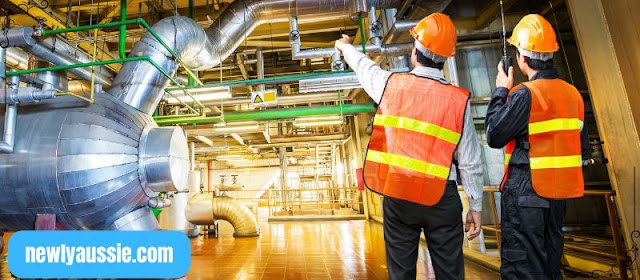Constructing an infrastructure requires experts and labourers with full dedication. In this modern era, why do people consider Dubai the most sophisticated place? Well, the answer is its exotic infrastructure, building, and approach towards technology.
In the vast construction industry, building an extensive infrastructure, its demolition, renovation, maintenance or repair are covered. Along with that, planning structural construction and finishing services such as painting, and decorating are linked with the construction industry.
Working in the construction industry in Australia allows you to work both in the city and rural areas. In addition, the construction sector jobs are usually well-paid jobs. Let’s check top 8 construction jobs in Australia that gives you secure income and future as well.
Read Also: Top 7 Health care jobs in Australia
1. Civil engineering draftsperson
A Civil Engineering Draftsperson prepares detailed blueprints and drawings for construction projects. They are also involved in the research, design, operation and maintenance of civil engineering construction projects. As per Labour Market Insights, a civil engineering draftsperson can earn up to AUD 90,000 annually. To work as a civil engineering draftsperson in Australia, you might need a formal academic education and Training in civil engineering, engineering drafting, and civil construction design sector.
2. Civil engineering technician
Civil engineering technicians is a qualified professionals involved in planning, designing, and building projects of a commercial, industrial, or residential nature. Civil engineering technicians cannot approve designs or supervise the overall project as they work under licensed civil engineers. To become civil engineering technician, a candidate has to own a university degree or Vocational Education and Training (VET) qualification. On average, the annual salary of a civil engineering technician is around AUD 90,000. (Source: Labour Market)
3. Electrician (general)
A general electrician is responsible for installing, testing, connecting, maintaining and modifying electrical equipment, components, appliances, wiring and control systems for domestic, industrial, commercial and purposes. As per Labour Market Insights, the average salary of a general electrician is around AUD 110,000 p.a. A certificate III in electro-technology qualifies a candidate as a general electrician.
4. Electrician (special class)
In a broader aspect, electricians, in a special category, are the professional who repairs minute and complex electrical and electronic circuitry. Coming to their day-to-day, these electricians check the blueprints and related specifications to determine the sequence and methods of operation. They run electronic test instruments to diagnose faults and repair and replace faulty components. According to Labour Market Insights, a salary of AUD 110,000 is earned by these electricians. A certificate III in electro-technology is needed to become an electrician of this type.
5. Home improvement installer
Adorning their house is something people love to do. To efficiently put the functional and decorative home improvement equipment, home improvement installers are crucial. They deal mostly with prefabricated windows and doors, exterior cladding, curtains, shower screens, blinds, security screens, garage doors, etc. As a home improvement installer, one can earn up to AUD 72,000 annually (Source: Labour Market Insights). For their installation job, they have to examine their plans for installations and prepare sites for installation. Certificate II or III in blinds, awnings, security screens and grilles, or having qualification in areas such as carpentry, joinery or metal trades can qualify you for this job. To become a home improvement installer, you need to be physically capable, able to drive, and flexible to work outdoors.
Read Also: Top 7 Cyber Security Jobs for a Better Future
6. Project engineer
Project engineer works effectively to manage engineering and construction works while being responsible for quality control to industry standards. Project Engineers work in offices and on–site construction of structures, roads, bridges, dams, pipelines, airports and systems for gas, water and sewer. The average salary range of a Project Engineer in Australia is AUD 120000 TO AUD 140,000. An engineering degree or a relevant Bachelor's degree in engineering, such as a Bachelor of Engineering (Honours) or Bachelor of Engineering (Civil) (Honours), makes you a perfect candidate to become a project manager. Also, you must have industrial experience.
7. Project Manager
Project managers coordinate and look for large construction projects-onsite and administration. They consult with planners and architects to estimate the required cost and materials while ensuring construction procedures. Project managers are rigorously involved in quality assurance and testing. As per Talent.com, a project manager (in engineering) salary in Australia can earn up to AUD 130,000 p.a. To become an engineering project manager, you need Bachelor's degree in engineering or another equivalent degree.
8. Contract Administrator
A contract administrator manages contracts between building contractors, employers, project managers, engineers, consultants and clients. The client (employer) or project architect can appoint the contract administrator. The average salary OF contract administrator in Australia is AUD 115,000 per year. Certificate IV in Building and Construction (Contract Administration) is the basic requirement for this sector. Certificate IV or Diploma in Project Management or Diploma of Contract Management is also considered. However, reputed large construction companies would prioritise applicants with Bachelor's degrees in construction management or civil engineering over Diploma holders.
What is White Card in a Construction job in Australia?
A white card, aka construction induction card, is THE crucial card for working in construction in Australia. This white card ensures the candidates have followed the training and are familiar with safety equipment and health and security policies in construction sites throughout Australia. White Card is recognised by all Australian states and territories and does not have any validity period. To receive a White Card, one must complete a dedicated course. Supervisors, surveyors, labourers and tradespeople are some construction-related jobs who are expected to have a white card. Along with the white card, construction workers must have appropriate English skills to comprehend the supervisor’s instructions.
Wrapping Up
Through the construction business, you are involved in creating infrastructure or buildings where people will later be working; you are indirectly making an impact on people's lives. This sort of help is rarely found in other professions. If you see yourself thriving in the construction business, then you can join the construction industry. Besides the above-mentioned jobs, there are numerous different jobs to choose from.



Post a Comment
Post a Comment